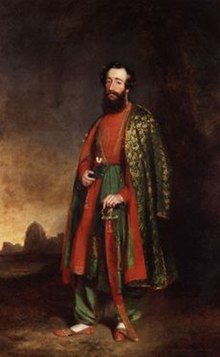Herbert Edwardes
| Major-General Sir Herbert Benjamin Edwardes KCB KCSI DCL |
|
|---|---|

Major Herbert Benjamin Edwardes, CB, DCL (1819–1868), The Hero of Multan, dressed as an Indian nobleman, by Henry Moseley, c.1850. National Portrait Gallery, London, (NPG 1391)
|
|
| Born |
12 November 1819 Frodesley, Shropshire, England |
| Died | 23 December 1868 (aged 49) London, England |
| Allegiance |
|
| Service/branch | British Army |
| Years of service | 1842–1868 |
| Rank | Major-General |
| Unit | 1st Bengal European Regiment |
| Battles/wars |
First Anglo-Sikh War Second Anglo-Sikh War |
| Awards |
Knight Commander of the Order of the Bath Knight Commander of the Star of India Doctor of Civil Law |
| Other work | Commissioner of Ambala (1862–1865) |
Major-General Sir Herbert Benjamin Edwardes KCB KCSI DCL (12 November 1819 – 23 December 1868) was an English administrator, soldier, and statesman active in the Punjab, India. He is best known as the "Hero of Multan" for his pivotal role in securing the British victory in the Second Anglo-Sikh War (1848–49).
Edwardes was born at Frodesley in Shropshire on 12 November 1819, the 2nd son of the Rev. Benjamin Edwardes (1790/1-1823), rector of Frodesley, a younger son of Sir John Thomas Cholmondeley Edwardes, 8th Baronet, of Shrewsbury (1764–1816). The Edwardes Baronetcy of Shropshire had been conferred on his ancestor Sir Thomas Edwardes by King Charles I in 1644/5.
Edwardes's mother died during his infancy, and from the age of four, following his father's death in 1823, he was brought up in the household of a deeply religious aunt, from whom he developed his own strongly Protestant Christian faith. At the age of ten he was sent to a boarding school at Richmond, Surrey, where he did not early distinguish himself. He went on to study Classics and Mathematics at King's College, London, and developed there a great interest in modern literature, composing poetry and drawing. He played a prominent role in the debating society.
Having been prevented from going up to Oxford by pressure from his guardians, Edwardes determined himself on a career in India. He applied directly to Sir Richard Jenkins GCB (1785–1853), of Bicton Hall, Salop. a deputy chairman of the East India Company, formerly of the Bombay Civil Service, Member of Parliament for Shrewsbury in 1837, and family friend, for a cadetship in the Bengal Infantry. He landed at Calcutta early in 1841, aged 22, and from July 1842 served as a Second Lieutenant in the 1st Bengal European Regiment, first at Dinapore and then at Karnal, a frontier station. He remained with this regiment about five years, during which time he obtained a good knowledge of the Hindustani, Urdu and Persian languages, passing exams in all 3 subjects, which qualified him for the position of interpreter, which he obtained in November 1845, aged 26. He developed a deep understanding of military, political and social affairs in India, which showed itself in his many literary contributions to the Delhi Gazette entitled "Brahminee Bull's letters to his Cousin John Bull", expressing bold political opinions often critical of British Indian policy. His essays became well-read throughout British India, and particularly impressed the Commander-in-Chief of the Indian Army himself, Sir Hugh Gough, who appointed Edwardes a member of his personal staff.
...
Wikipedia
